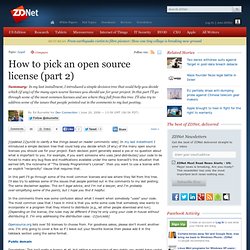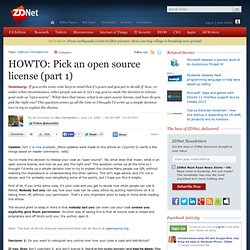

The GNU General Public License v3.0. Version 3, 29 June 2007 Copyright © 2007 Free Software Foundation, Inc. < Everyone is permitted to copy and distribute verbatim copies of this license document, but changing it is not allowed. Preamble The GNU General Public License is a free, copyleft license for software and other kinds of works. The licenses for most software and other practical works are designed to take away your freedom to share and change the works. When we speak of free software, we are referring to freedom, not price. To protect your rights, we need to prevent others from denying you these rights or asking you to surrender the rights. For example, if you distribute copies of such a program, whether gratis or for a fee, you must pass on to the recipients the same freedoms that you received.
Developers that use the GNU GPL protect your rights with two steps: (1) assert copyright on the software, and (2) offer you this License giving you legal permission to copy, distribute and/or modify it. 0. 1. 2. 3. 4. 5. Aardvark. ? Professional Open Source. How to pick an open source license (part 2) [Updated 22jun06 to clarify a few things based on reader comments -ebb].

In my last installment I introduced a simple decision tree that could help you decide which (if any) of the many open source licenses you should use for your project. Each decision point generally asked a yes or no question about what is important to you. For example, if you want someone who uses [and distributes] your code to be forced to make any bug fixes and modifications available under the same licenseIt's this situation that earned GPL the nickname of "The Greedy Programmer's License". then you want to use a license with an explicit "reciprocity" clause that requires that.
In this part I'll go through some of the most common licenses and see where they fall from this tree. I'll also try to address some of the issues that people pointed out in the comments to my last posting. In the comments there was some confusion about what I meant when somebody "uses" your code. Public domain ASLv2 (Apache) GPL (v2) HOWTO: Pick an open source license (part 1) Update: Part 2 is now available.

[More updates were made to this article on 22jun06 to clarify a few things based on reader comments. -ebb] You've made the decision to release your code as "open source". Ok, what does that mean, what is an open source license, and how do you pick the right one? This question comes up all the time so I thought I'd write up a simple decision tree to try to explain the choices.Many people use GPL without realizing the implications or understanding the other options.
First of all, if you write some code, it's your code and you get to decide how other people can use it. The second point to keep in mind is that nobody but you can even use your code unless you explicitly give them permission. Note: The text of all the licenses mentioned here can be found at opensource.org.
Decision 1: Do you want to relinquish any control over how your code is used and distributed? If yes, then don't copyright it, and don't license it. If yes, then continue to decision 3.